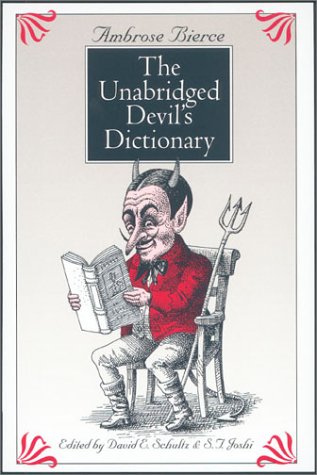Alliance, n. In international politics, the union of two thieves who have their hand so deeply inserted in each other's pocket that they cannot successfully plunder a third.
Destiny, n. A tyrant's authority for crime and a fool's excuse for failure.
Diplomacy, n. The patriotic act of lying for one's country.
Evangelist, n. A bearer of glad tidings, particularly (in a religious sense) such as assure us of our own salvation and the damnation of our neighbors.
History, n. An account, mostly false, of events, mostly unimportant, which are brought about by rulers, mostly knaves, and soldiers, mostly fools.
Imagination, n. A warehouse of facts, with poet and liar in joint ownership.
Infancy, n. The period of our lives when, according to Wordsworth, "Heaven lies about us." The world begins lying about us pretty soon afterward.
Occident, n. The part of the world lying west (or east) of the Orient. It is largely inhabited by Christians, a powerful subtribe of the Hypocrites, whose principal industries are murder and cheating, which they are pleased to call "war" and "commerce." These, also, are the principal industries of the Orient.
Ocean, n. A body of water occupying about two-thirds of a world made for man - who has no gills.
Politics, n. A strife of interests masquerading as a contest of principles. The conduct of public affairs for private advantage.
Rational, adj., Devoid of all delusions save those of observation, experience, and reflection.
Religion, n. A daughter of Hope and Fear, explaining to Ignorance the nature of the Unknowable.
June 24 is the anniversary of the birth in 1842 of American journalist and short-story writer Ambrose Gwinett Bierce (wiki) (1842-1914?), remembered primarily as the author of The Devil's Dictionary. Born in Meigs County, Ohio, Bierce served the Union Army in the Civil War as a "topographical engineer," i.e., a map-maker, but he became a journalist after the conflict and settled in San Francisco.
 |
| Cover of the graphic novel version of The Devil's Dictionary |
As the literary arbiter of the West Coast at the turn of the 20th century, he found early success as a writer of such short stories as "An Occurrence at Owl Creek Bridge,"* many of them based on his experiences in the army.* The Devil's Dictionary, a compilation of irreverent definitions of common words and phrases, derives from a series of newspaper columns that Bierce wrote between 1881 and 1886 and then from 1904 to 1906. In 1913, he left San Francisco - at age 71 - to cover the uprising of Pancho Villa in Mexico and was never heard from again. Various theories - including suicide - and unsubstantiated reports of his death have been evinced to explain his disappearance, but the mystery remains.** George Bernard Shaw (1856-1950) had characters like Bierce in mind when he noted,
"The power of accurate observation is commonly called cynicism by those who have not got it."
* N.B. Below is a well-received film version of An Occurrence at Owl Creek Bridge,", from The Twilight Zone:
** The excellent site Today I Found Out (I highly recommend their book The Wise Book of Whys, copies of which I've given to several people as gifts) has a good roundup of the theories regarding his death: Whatever Happened to Ambrose Bierce?


No comments:
Post a Comment